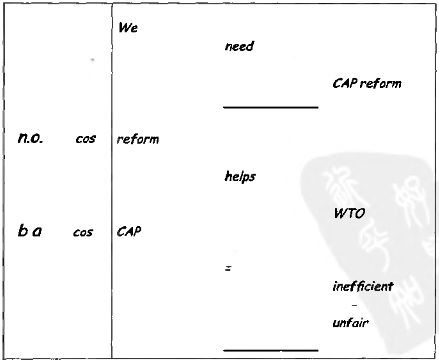- 簽證留學(xué) |
- 筆譯 |
- 口譯
- 求職 |
- 日/韓語 |
- 德語
Yes, it will happen. You will be concentrating on one thing and another will pass you by. This will happen more often while you're learning than later. But it won't stop happening the day you pass your final exams. So how do you deal with the situation?
Omissions
If, for lack of time, you can't manage to note something you would like to, make sure you mark the place very clearly so that at least your memory has a chance to reconstruct the missing information. This is particularly easy with lists. Let's imagine that in the example below you had missed one of the adjectives towards the end, for example, hugely expensive. If you note the omission as a hyphen in the list, as in the example below, you will at least know when you read back your notes that something is missing, and from context and with the help of your memory you have a good chance of recalling what.
Example (Torry 1)
We also need CAP reform - not just because it helps in the WTO - but, perhaps nore important because the CAP is simply an inefficient, hugely expensive and unfair system.

Questions to the speaker
This is a subject on which there are as many opinions as there are interpreters! Sometimes you will find that you have failed to note or hear properly something that was clearly important to the speech. Whether you ask a question of the speaker or not will depend a lot on the situation you are working in. If it is a small working group touring a building and getting on well with one another, you may decide that a question to the speaker is appropriate in order to get things right. It may even help your rapport with your clients. If, however, one dignitary is speaking at some ceremonial event in front of a captive audience of dozens or more people, it is unlikely that the situation is going to be conducive to your interrupting proceedings to ask a question. As far as accreditation tests for large institutions are concerned, one or even two questions are sometimes allowed, but candidates must be careful, having asked the question, then to get that bit of the speech right! Deciding whether to ask a question will always ha a tough call that you will have to make on the spot.
Before you make that decision though, make sure that you can find the part of your notes you may be about to ask a question on. Here are two techniques that work:
- mark a big X on the right hand side of the page AND than leave your spare pen or pencil between the pages in question as a bookmark.
- mark a big X on the right hand side of the page AND fold the offending page of your notepad diagonally across itself so that it sticks out of the side of the rest of the pad and can be found again immediately when you are looking for it later.
If you decida to ask a question, make sure it is in the speaker's language, clear and succinct. You should ask politely for specifics, e.g. "Could you please repeat the date on which the company opened offices in Cologne?" and not for general explanation. A question like, "I didn't understand the bit about the new marketing strategy" is unacceptable anywhere.
Techniques like this should be practised in the safety of the classroom before being used at work or in examinations. They must be incorporated into your general presentation technique, and never give the impression of incompetence or disarray.
責(zé)任編輯:admin
